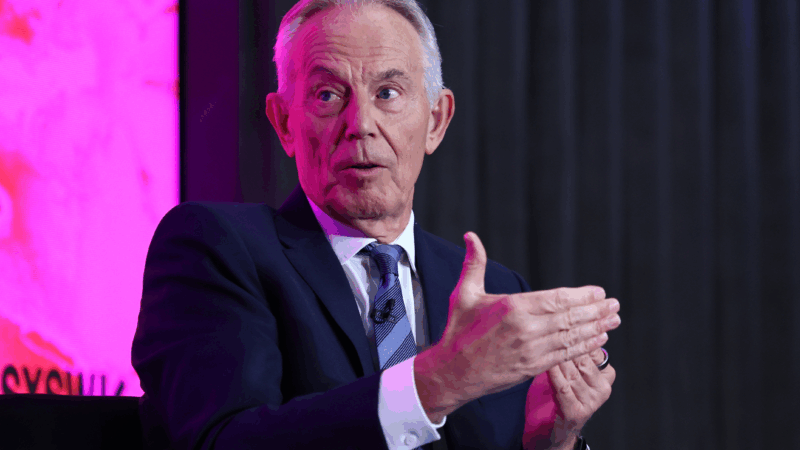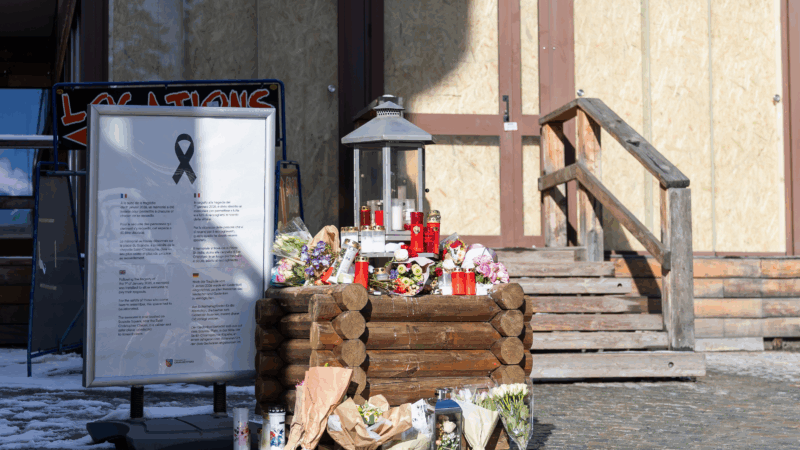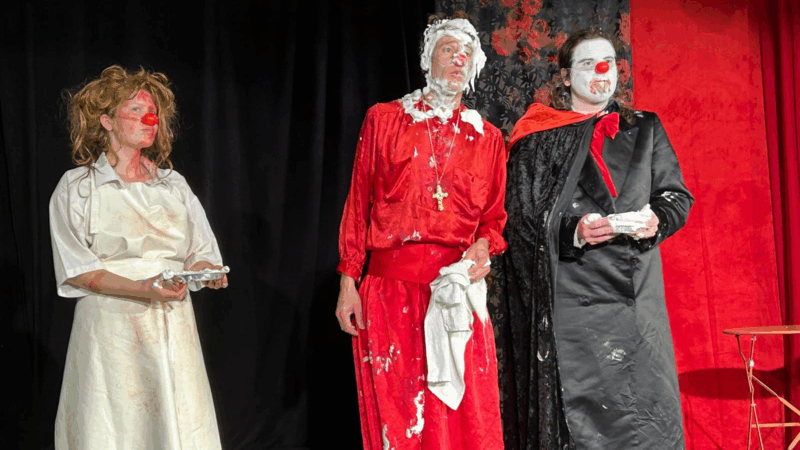What to know about former U.K. leader Tony Blair, tapped by Trump for postwar Gaza role
LONDON — In President Trump’s 20-point plan to end the war in Gaza, only one name appears other than his own: Tony Blair.
Blair, as prime minister of the United Kingdom, helped negotiate a 1998 peace deal ending decades of sectarian fighting in Northern Ireland. He later served as a Middle East peace envoy for the international community, and now runs a London think tank.
But the 72-year-old former politician comes with baggage: He’s reviled in the U.K. and internationally for his 2003 decision to join President George W. Bush’s U.S.-led invasion of Iraq.
That war led to some 200,000 civilian deaths and triggered some of the biggest street protests in modern British history. It was a military quagmire, and contributed to a precipitous drop in Blair’s approval rating, according to Ipsos polling throughout his decade in power. No other prime minister in modern British history experienced such a steep plunge in popularity.
After a U.K. government inquiry concluded in 2016 that Blair’s decision to help invade Iraq was made hastily, on the basis of flawed intelligence, he offered a tearful public apology, saying he felt “more sorrow, regret and apology than you may ever know or can believe.”
Now, nearly two years into the devastating Gaza war, Blair appears poised to cast his lot with another U.S. president — who’s promising a better outcome in Gaza than there was in Iraq.
What role Blair might play in Gaza
Trump’s new plan for Gaza includes a “Board of Peace,” chaired by the U.S president himself. But he told reporters the board would also include “very distinguished leaders” from other countries. The only person he named was Blair.
In a statement, Blair called Trump’s plan “bold and intelligent.”
He’s been involved in talks about Gaza’s future for a while already. An official close to Blair, who wasn’t authorized to speak about the matter, told NPR that the former U.K. prime minister visited the White House in August for talks about Gaza with Trump’s son-in-law and adviser Jared Kushner and other figures.
Staff from Blair’s think tank have also reportedly been involved in talks about plans to transform Gaza into a “Trump Riviera” with a manufacturing zone named after Elon Musk.
In February, Trump shared an AI-generated video of his plans, including images of a glitzy resort called “TRUMP GAZA.”
Blair’s think tank refused to comment to NPR about those plans or its involvement in them.
What Palestinians think
Palestinians were not consulted on Trump’s 20-point plan for Gaza, nor on Blair’s involvement in Gaza’s future.
On Wednesday, Omar Awadallah, a top Palestinian official, told NPR he “welcomes” Trump’s efforts, but wants further discussion on the plan’s details.
“All the Palestinians should welcome the efforts of Mr. Trump, because we see it as an opportunity to end the bloodshed in Gaza,” said Awadallah, the Palestinian Authority’s deputy foreign affairs minister. “About the transitional government or transitional committee, I think we need work on this to change the dynamics and to enter into a dialogue on the details.”
The plan would require Hamas to release all Israeli hostages at the start of a ceasefire, before Israel commits to any part of the deal. It does not lay out a clear timeline for Israeli withdrawal from Gaza, instead linking that to disarmament.
Trump told reporters Tuesday he would give Hamas “three or four days” to respond to his plan.
A member of the Hamas political bureau, Husam Badran, has already been quoted as saying he considers Blair to be “the devil’s brother” and denounced his involvement.
“Tony Blair is not a welcome figure in the Palestinian cause, and therefore any plan associated with this person is an ill omen for the Palestinian people,” Badran was quoted as telling Al Jazeera.
International figures who’ve worked with Palestinians are also skeptical. The United Nations’ special rapporteur for the occupied Palestinian Territories, Francesca Albanese, wrote on social media: “Tony Blair? Hell no. Hands off Palestine. Shall we meet in The Hague perhaps?”
That’s a reference to the location of the International Criminal Court in the Netherlands.
Some of Blair’s fellow Brits say the same
Blair’s decisions about Iraq still taint his reputation at home.
Polling by the U.K. company YouGov shows 43% of Britons dislike Blair, compared to 25% who have a positive opinion and 26% who are neutral.
This week, when the BBC asked British writer and political theory lecturer Ash Sarkar about the significance of Blair’s involvement in Gaza plans, she replied: “It’s because Satan was unavailable.”
In a Guardian op-ed, Josh Paul, who worked in postwar Iraq and as a U.S. security coordinator in Israel and the Palestinian Territories, wrote that he “could not square” Blair’s visions for both those regions with the reality he saw firsthand on the ground. Paul predicts what he calls a “Kushner-Blair proposal” for Gaza will be seen as a “western occupational government” imposed on the Middle East.
“It will not work, and it should not be trusted,” Paul writes.
Blair’s prior experience in conflict zones
Blair declined NPR’s request for an interview. His former political secretary, John McTernan, says Blair is skilled at tuning out naysayers and the former prime minister is confident he can help Gaza.
“He will never back off of something because people say it’s difficult,” McTernan says. “He settled an 800-year conflict between Britain and Ireland. So he’s a man who’s actually delivered a peace process and knows all the issues around negotiating and delivering.”
As prime minister of the United Kingdom from 1997 to 2007, Blair participated in peace negotiations in Northern Ireland, a part of the U.K. that saw decades of sectarian violence between Roman Catholics and Protestants, known as the Troubles. In 1998, Blair signed the Good Friday Agreement, largely ending that conflict.
After leaving office, he served for nearly eight years as a special envoy for the Quartet — the United States, U.N., European Union and Russia — trying to negotiate Israeli-Palestinian peace. He was not successful.
Over the years, he’s run several businesses and non-profits — including Tony Blair Associates, the Tony Blair Sports Foundation, the Tony Blair Faith Foundation, the Tony Blair Africa Governance Initiative — most of which have since been folded into a London think tank which he founded in 2016 and also named after himself.
All of that has largely been overshadowed by Iraq. Many around the world still see Blair as a polarizing figure.
On the streets of Baghdad this week, residents reacted to news of Blair’s role in another Middle East project.
“He was one of the main contributors to the destruction of Iraq, and he also came out and admitted that he contributed to its destruction,” a man named Hassan Abdullah told Reuters. “So it’s not a good choice to have him as a peacemaker for the Gaza Strip.”
NPR producer Fatima Al-Kassab contributed to this report.
Swiss Alpine bar fire claims 41st victim, an 18-year-old Swiss national
Swiss prosecutors have opened a criminal investigation into the owners of Le Constellation bar in the ski resort of Crans-Montana, where a fire in the early hours of Jan. 1 killed dozens.
Sunday Puzzle: Rhyme Time
NPR's Ayesha Rascoe plays the puzzle with WBUR listener Laurie Rose and Weekend Edition Puzzlemaster Will Shortz.
Alcaraz beats Djokovic to become the youngest man to complete a career Grand Slam
The 22-year-old Spaniard's win against 38-year-old rival Novak Djokovic at Sunday's Australian Open makes him the youngest male player to win all four major tournaments.
You already know the song — now, ‘The One About the Blackbird’ is also a picture book
In The One About the Blackbird, a young boy learns to play guitar from his grandfather. And there's one song in particular that they love…
At a clown school near Paris, failure is the lesson
For decades, students at the Ecole Philippe Gaulier have been paying to bomb onstage. The goal isn't laughs — it's learning how to take the humiliation and keep going.
In the world’s driest desert, Chile freezes its future to protect plants
Tucked away in a remote desert town, a hidden vault safeguards Chile's most precious natural treasures. From long-forgotten flowers to endangered crops.







